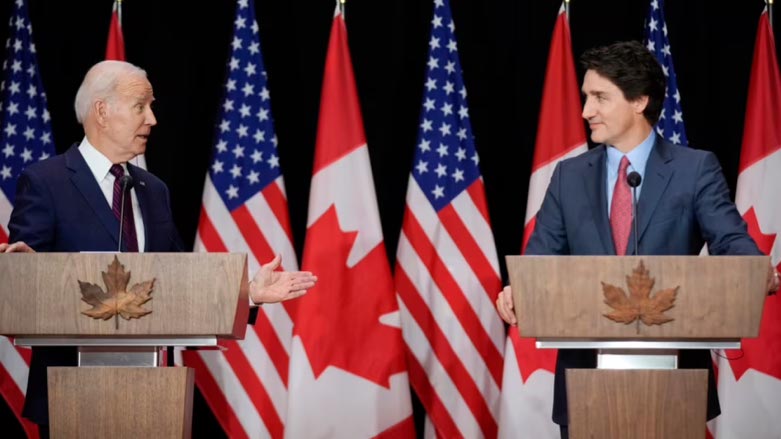Biden warns Tehran against further assaults on US troops, as Iran attacks again, and Republicans see weakness
“Our deterrence against Iran is broken,” McCaul complained. “We need to restore our deterrence against Iran or face further devastating consequences.”

WASHINGTON DC, United States (Kurdistan 24) – Speaking in Ottawa on Friday, after meeting with Canada’s Prime Minister Justin Trudeau, U.S. President Joe Biden warned Iran against further assaults by its proxies on U.S. troops in northeast Syria.
“The United States does not—does not, I emphasize—seek conflict with Iran,” Biden said, “but be prepared for us to act forcefully to protect our people.”
“That’s exactly what happened last night,” Biden continued, alluding to Thursday’s drone attack by a pro-Iranian group which killed a U.S. contractor on a base near Hasakah. It was followed by retaliatory U.S. strikes against two sites in eastern Syria used by pro-Iranian groups.
Read More: U.S. strikes eastern Syria, after deadly attack by Iran-backed group
However, there have been many attacks by Iranian proxy groups against U.S. forces before Thursday’s lethal drone assault. CENTCOM Commander, Gen. Michael “Erik” Kurilla testified last week before the Senate Armed Services Committee and this week before the House Armed Services Committee.
In his Congressional testimony, Kurilla described Iran as “the largest malign actor in the region.” He also detailed an increasing number of assaults on U.S. forces, explaining that there had been 78 such attacks by Iranian-backed groups since January 2021.
Lack of U.S. Deterrence
Kurilla’s remarks prompted strong criticism of the Biden administration from Rep. Michael McCaul (R, Texas), the powerful chairman of the House Foreign Affairs Committee. As McCaul noted in a written statement, “Prior to this attack [on Thursday], Iranian proxies had attacked U.S. forces 78 times since the beginning of 2021, yet this administration only responded kinetically three times.”
Moreover, despite statements by senior officials on Thursday that the U.S. response was “intended to limit the risk of escalation,” as Secretary of Defense Lloyd Austin stated, it did no such thing.
Rather, Iranian-backed groups counter-attacked U.S. retaliation. On Friday, they launched, as The New York Times reported, “rocket and drone attacks on coalition targets, including a second U.S. base in the area, called Green Village.” Another American was injured in that attack, the Times said.
“Our deterrence against Iran is broken,” McCaul complained. “We need to restore our deterrence against Iran or face further devastating consequences.”
Indeed, as Kurdistan 24 noted after Thursday’s military exchanges, there were serious questions as to whether the U.S. would actually deter Iran from further attacks, because the U.S. position was so restrained. U.S. officials said they had delivered a “proportionate” response, but why should Iran fear that? Such a position—responding in kind—allows the enemy to set the dimensions of the conflict.
On Friday, Sen. Lindsey Graham (R, South Carolina) lambasted the Biden administration’s position.
“America has only one path available when attacked–respond swiftly and vigorously with overwhelming, punishing force designed to make enemies wary of engaging with the United States,” Graham said in a written statement. Being strong is the best deterrence against future attacks.”
The outcome of the confrontation between the U.S. and Iran remains to be seen. However, the latest developments have, at least, brought to light the extent of that confrontation.